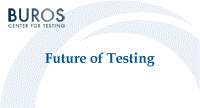Buros-Nebraska Series on Measurement and Testing

The Future of Testing
Date of this Version
1986
Document Type
Article
Citation
Published in The Future of Testing, edited by Barbara S. Plake & Joseph C. Witt (Hillsdale, NJ: Lawrence Erlbaum Associates, 1986).
Abstract
Licensure and certification examinations constitute a major use of tests in the United States, and since licensure and certification provide obvious benefits to the persons licensed or certified and to the public, their use is not likely to decrease. Rather, the usage of such examinations to document competence is likely to continue to increase, although perhaps more slowly than it has in the recent past.
Critics of licensure have argued that licensure tends to benefit the licensed profession more than the public and that the benefits of licensure to the public do not always justify the costs (e.g., see Hogan, 1979; Williamson, 1976). However, the weight of criticism of licensure and certification tends to be that they do not provide sufficient protection rather than that protection is not needed. Furthermore, if licensure were eliminated in areas like the health professions, we would undoubtedly experience some increase in quackery, leading to demands for increased protection. Therefore , I expect that the criticisms of licensure and certification are more likely to change the social and legal context in which the various forms of credentialing operate than they are to decrease the extent of credentialing. In particular, the trend has been in the direction of greater public scrutiny of the activities of licensing and certifying bodies accompanied by demands for more public disclosure.
Both licensure and certification are credentials intended to document the possession of specialized knowledge and skills. Both forms of credentials confer on their holders certain privileges and responsibilities. They differ in the source of the credential and in the legal status of the credential.
Licensure is a state function and is usually administered by a state board with legal authority to regulate the practice of the profession. Although professional organizations have traditionally been involved in setting standards and nominating members of state licensure boards, ultimate authority rests with the state legislature. The laws vary from state to state and from profession to profession, but, in general, a license confers on its holder the right to use a title and to provide certain services that the licensure law makes illegal for nonlicensed persons to provide. It also subjects the licensed professional to regulation by the state licensing authority, often referred to as the "board." The license is interpreted as indicating that its holder has the basic knowledge and skills required for safe and effective practice.


Comments
Copyright © 1986 by Lawrence Erlbaum Associates. Digital edition copyright © 2012 Buros Center for Testing. This book may be downloaded, saved, and printed by an individual for their own use. No part of this book may be re-published, re-posted, or redistributed without written permission of the holder of copyright.